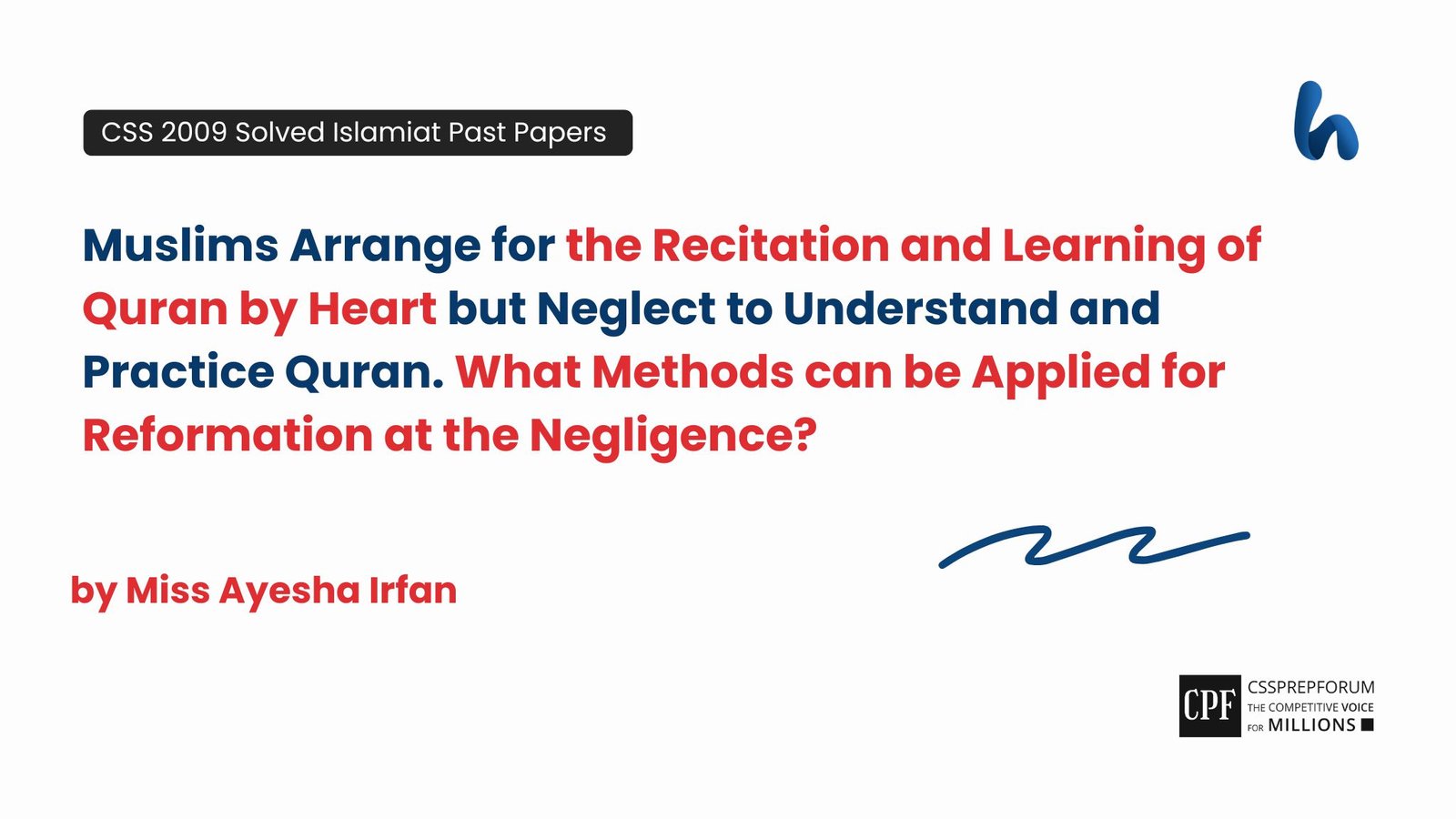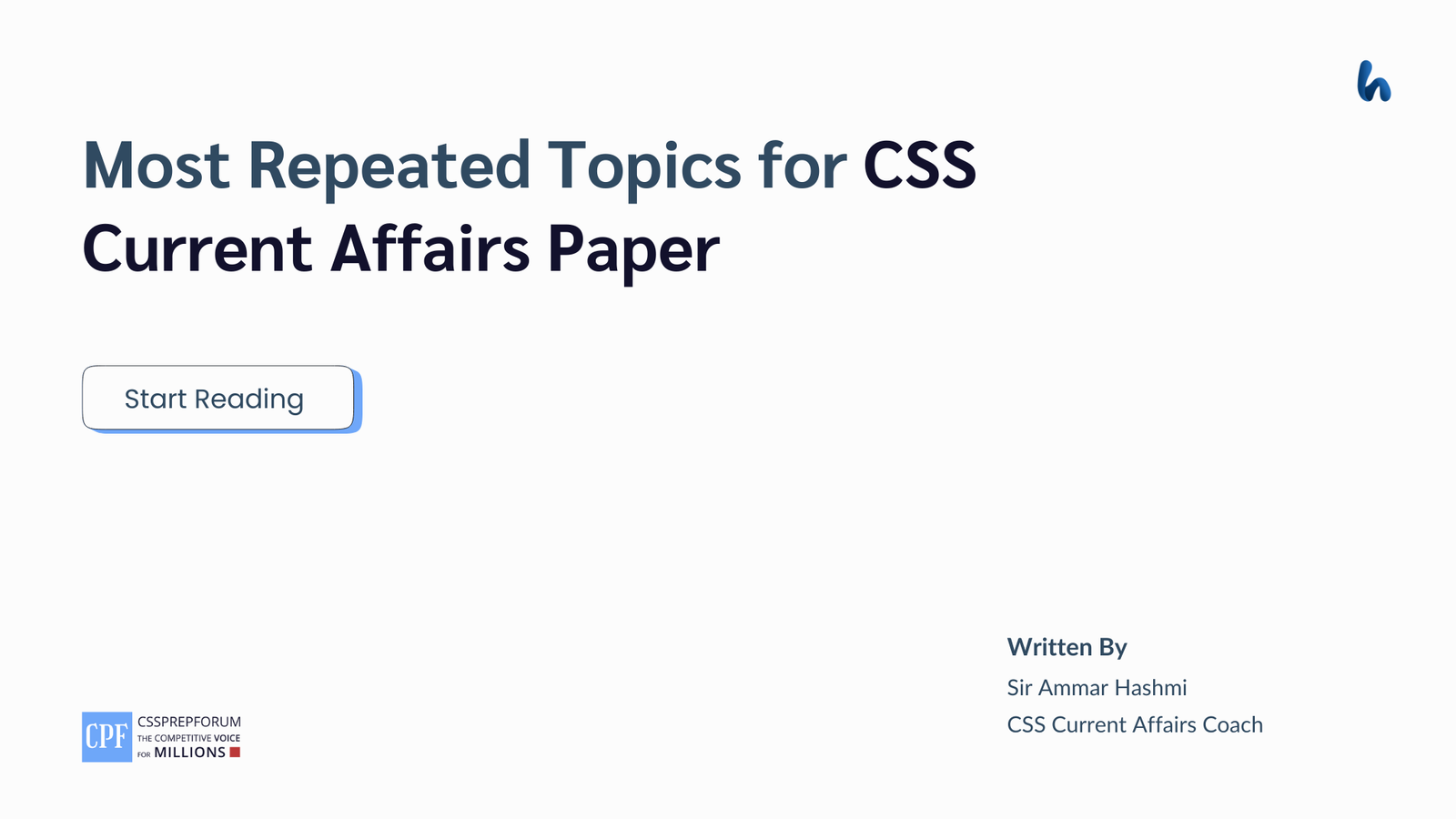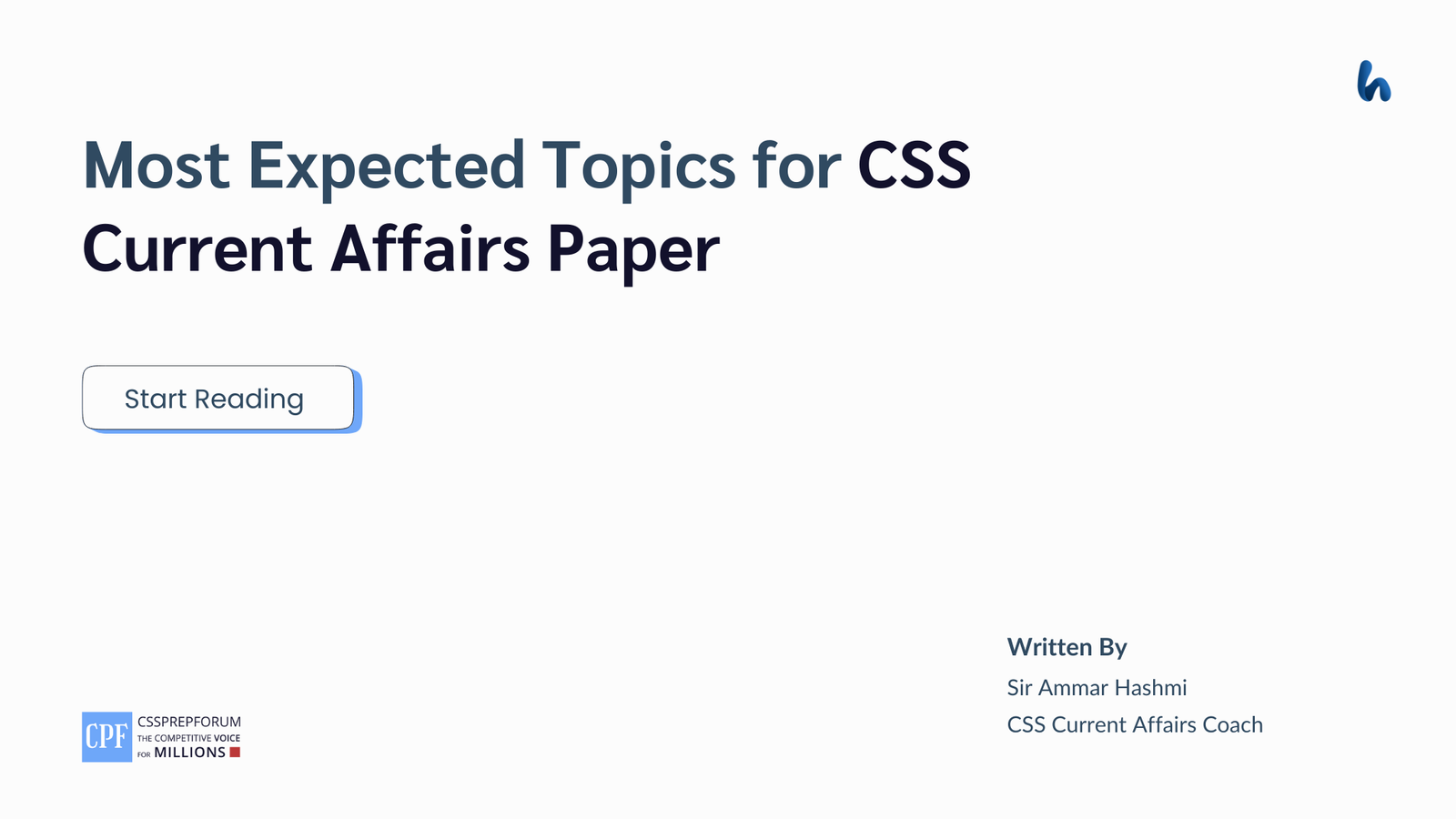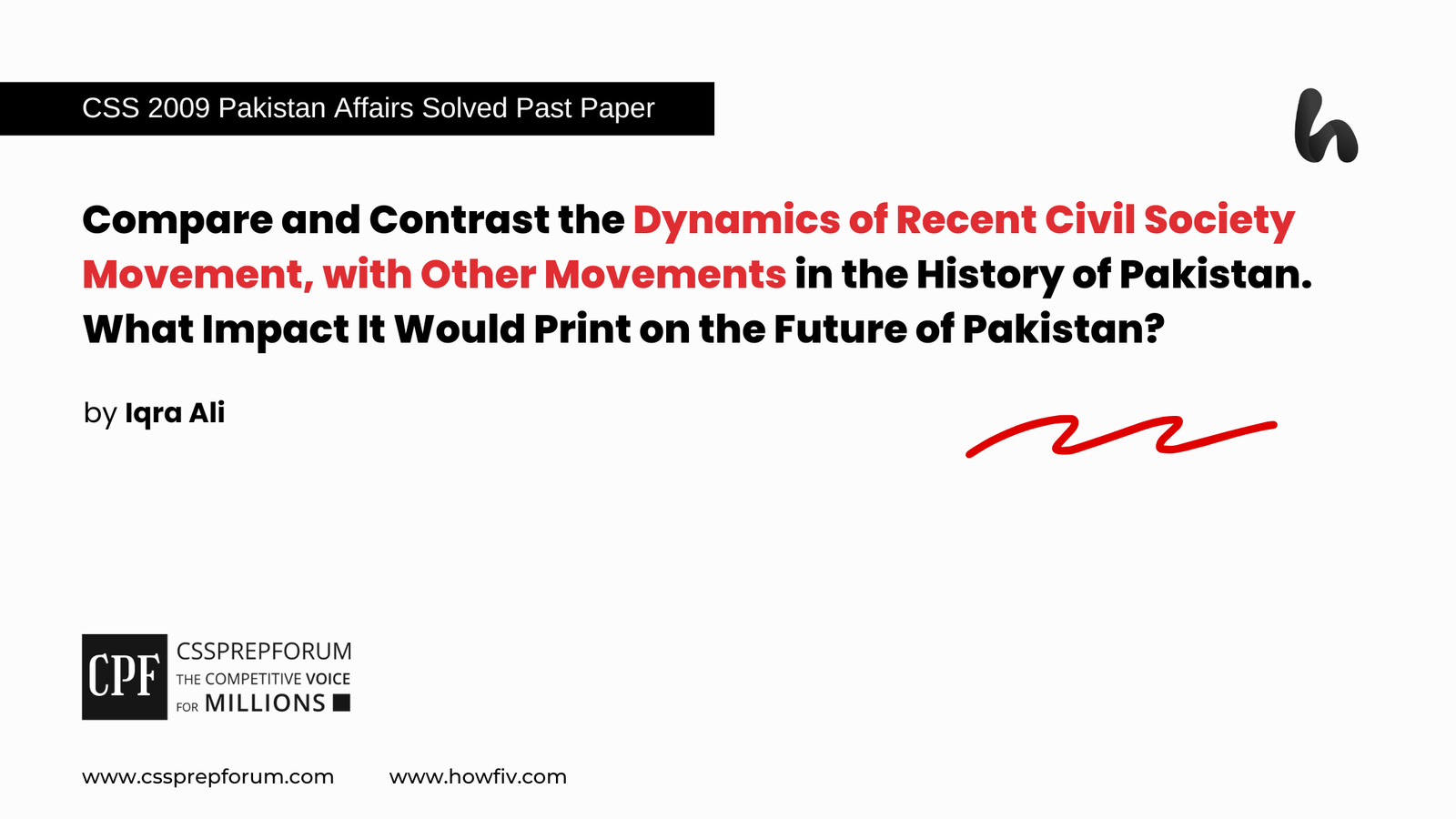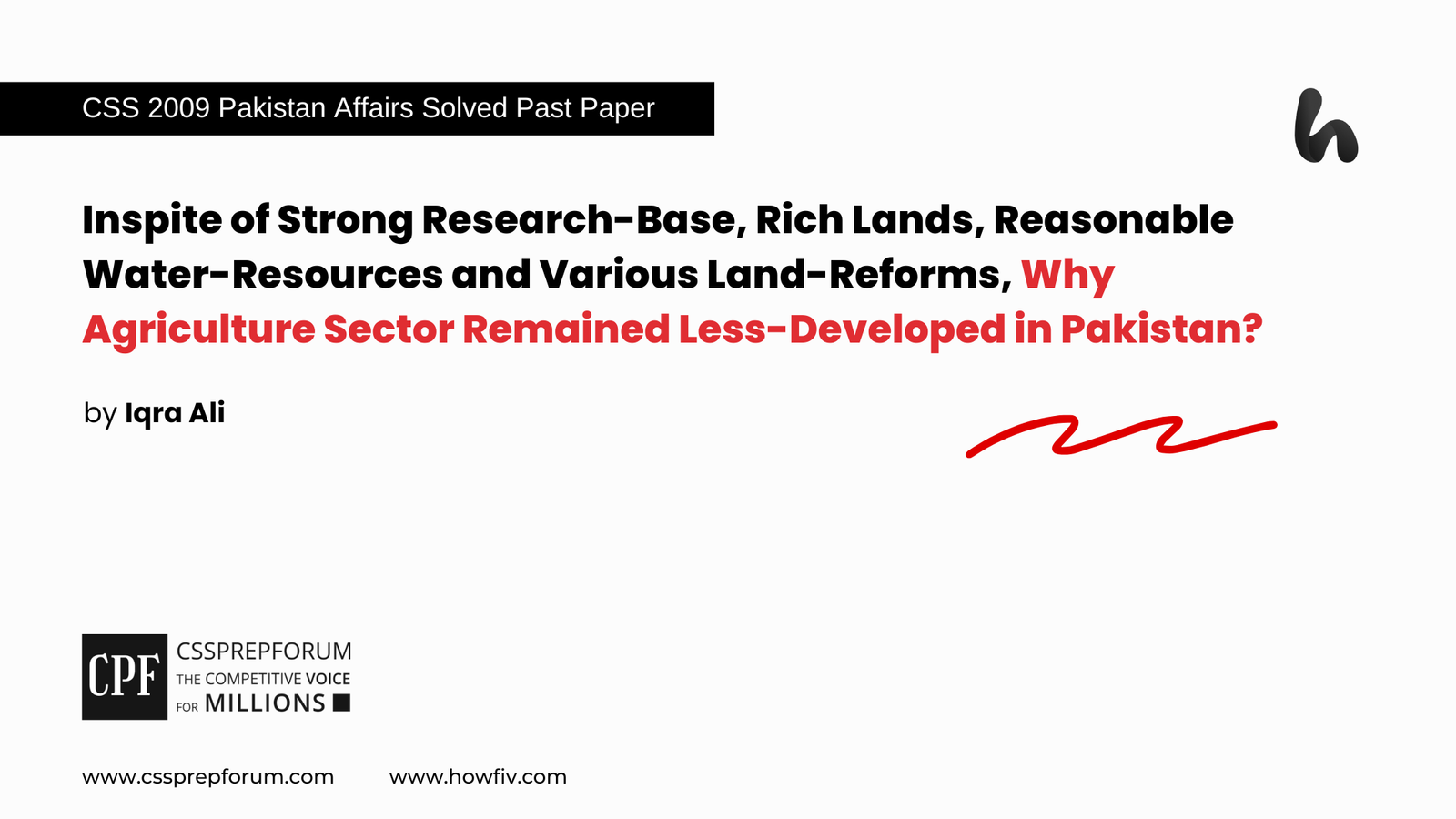CSS Solved Islamiat Past Papers | Hazrat Muhammad (PBUH) as a Prophet of Peace
The following question of Islamiat is solved by Miss Ayesha Irfan, the highest scorer in CSS Islamiat. Moreover, the question is attempted on the same pattern taught by Sir Syed Kazim Ali to his students, scoring the highest marks in compulsory subjects for years. This solved past paper question is uploaded to help aspirants understand how to crack a topic or question, how to write relevantly, what coherence is, and how to include and connect ideas, opinions, and suggestions to score the maximum.

Outline
1- Introduction
2- Importance of peace for the contemporary international world
3- Significance of Prophet Muhammad’s teachings for global peace
4- Global peace strategies
- ✓Teachings of peace
- ✓Diplomacy and conflict resolution
- ✓Social justice and equality
- ✓Multiculturalism and religious pluralism
- ✓Environmental stewardship
- ✓Education and cultural exchange
- ✓Economic development
- ✓Humanitarian principles
- ✓Community building and social cohesion
- ✓Rules for wars
5- Conclusion

Introduction
Conflict is an unavoidable characteristic of individual life and in the international system. On the contrary, peace is a desirable condition for the better existence of human life and societies. From the beginning of human history until the contemporary modern world, peace has remained one of human beings’ basic requirements and goals. According to Webster’s Dictionary, peace has the following characteristics: condition of harmony or calm; absence of social disorder; condition of security; maintenance of order through law or convention within a society; abolition of war; state of compromise after conflict or hostility. As a peacemaker, Prophet Muhammad (PBUH) is widely acknowledged for promoting peace, compassion, and justice throughout his life. His (PBUH) approach to spreading Islam was rooted in peaceful dialogue and mutual respect. His (PBUH) interactions with various communities within and outside Arabia reflected a commitment to resolving conflicts through diplomacy and fair negotiation. Beyond his role as a spiritual guide, Prophet Muhammad’s (PBUH) teachings and actions have profound implications for fostering peace in the contemporary international world. His (PBUH) life offers a timeless blueprint for harmony, justice, and coexistence relevant to promoting global peace in today’s interconnected and diverse world. The central theme of Prophet Muhammad’s (PBUH) teachings is based on peace. Islam is a religion of peace.
Importance of peace for the contemporary international world
The importance of peace for the contemporary international world cannot be overstated, as it serves as the cornerstone for the well-being, progress, and sustainable development of nations and the global community. Peace is fundamental to ensuring the safety, security, and well-being of individuals and communities; further, it promotes educational activities, economic prosperity and the nation’s development. Economic development becomes sustainable when resources are directed towards growth rather than military expenditures or post-conflict reconstruction. Moreover, collaboration on climate change, public health, and global security becomes more achievable when countries are not mired in conflicts. Therefore, it is evident that it is not merely the absence of conflict but a dynamic and positive force towards cooperation and development of nations and world peace.
Significance of Prophet Muhammad’s (PBUH) teachings for global peace
The teachings of Prophet Muhammad (PBUH) hold significant relevance for global peace. He (PBUH) emphasized the principles of justice and fairness in all aspects of life. His (PBUH) teachings encourage societies to establish just legal systems, ensuring the equitable treatment of individuals regardless of their background. He (PBUH) said: “All mankind is from Adam and Eve; an Arab has no superiority over a non-Arab, nor a non-Arab has any superiority over an Arab; also, a white has no superiority over a black, nor a black has any superiority over a white”. In diplomatic terms, Prophet Muhammad (PBUH) was a proponent of dialogue and peaceful resolution of conflicts. His approach to dispute resolution involved negotiation, mediation, and diplomacy. He (PBUH) offers a model for contemporary leaders seeking peaceful solutions to complex geopolitical challenges. Environment sustainability and stewardship are tools to promote harmony and mutual collaboration. He (PBUH) advocated for environmental stewardship and responsible use of resources. His teachings include guidelines on preserving natural resources, avoiding waste, and respecting the environment. However, the principles derived from Prophet Muhammad’s (PBUH) teachings offer a timeless and universal guide for creating a more just, compassionate, and harmonious global community.
Global Peace Strategies
The global peace strategies involve developing and implementing comprehensive approaches to fostering peace, stability, and cooperation among nations and communities worldwide. These strategies aim to elaborate on the root causes of conflicts, promote dialogue, and build sustainable frameworks for peaceful coexistence. As a prophet of peace, Prophet Muhammad (PBUH) left a rich legacy of teachings encompassing various aspects relevant to contemporary international relations. His (PBUH) teachings provide a framework for building a harmonious and inclusive global society. Teachings of Prophet Muhammad (PBUH) as a Prophet of peace are mentioned:
- Teachings of Peace
Prophet Muhammad’s (PBUH) teachings emphasize Islam’s fundamental concept of peace (Salaam). The Quran describes God as the “Lord of Peace,” and Muslims often greet each other with the words “Assalamu Alaikum,” meaning “Peace be upon you.” Allah mentioned in the Quran:” Allah invites to the Home of Peace, and guides whomever He wills to a straight path”. The Prophet (PBUH) advocated for resolving conflicts through peaceful means whenever possible, as Allah mentioned in the Quran: “Those who forgive the injury and make reconciliation will be rewarded by God “, encouraging dialogue, negotiation, and compromise.
- Diplomacy and Conflict Resolution
Soft diplomacy is a tool for peaceful diplomatic relations among nations. Conflicts are best resolved with diplomatic talks and dealings. The Prophet’s (PBUH) life is replete with examples of diplomatic efforts and conflict resolution. One notable instance is the Treaty of Hudaybiyyah, where the Prophet (PBUH) negotiated peacefully to prevent an impending conflict. His (PBUH) commitment to diplomacy, consultation (shura), and consensus-building serve as a model for resolving contemporary geopolitical disputes through dialogue and peaceful negotiations.
- Social Justice and Equality
Prophet Muhammad’s (PBUH) teachings strongly emphasize social justice and equality. He (PBUH) advocated for the fair treatment of all people, regardless of their social status, ethnicity, or background. The Quranic principle of justice is encapsulated in the famous verse: “O you who have believed, be persistently standing firm for Allah, witnesses in justice, and do not let the hatred of a people prevent you from being just. Be just, for that is nearer to righteousness.”
- Multiculturalism
Globalization connects countries and continents. It promotes multiculturism and multi-ethnic communities all over the world. It connects connections with different religious and cultural communities for peaceful coexistence. The Charter of Medina, established by the Prophet (PBUH) upon his migration to the city, exemplifies a commitment to multiculturalism. The charter recognized the rights of diverse religious and tribal communities, establishing a framework for coexistence. The principles embedded in the Charter of Medina serve as a historical precedent for embracing and respecting cultural diversity in contemporary societies.
- Religious Pluralism
Prophet Muhammad’s (PBUH) teachings emphasize respecting and protecting religious freedom. The Quran acknowledges the existence of diverse religious communities, stating, “For you is your religion, and for me is my religion.” The Prophet’s (PBUH) interactions with Christians, Jews, and other religious groups highlight a spirit of tolerance and coexistence, providing a foundation for promoting religious pluralism in the modern world.
- Environmental stewardship
The 21st century is witnessing a climate crisis. Climate challenges need a collective effort to maintain stability.1400 years ago, Prophet Muhammad (PBUH) educated and advised us to protect and care for nature. He (PBUH) emphasized the interconnectedness of all creation, urging respect for animals and plants. He (PBUH) taught that “The world is a green mosque” and encouraged responsible use of resources, stating, “Do not waste water even if you are at the bank of a flowing river.” This aligns with the need for sustainable practices in today’s environmentally challenged world.
- Education and Cultural Exchange
Education broadens borders and opens minds for international communities. It promotes harmony and understanding. The Prophet (PBUH) placed a strong emphasis on knowledge and education. His (PBUH) teachings encouraged seeking knowledge, and he said, “Seek knowledge from the cradle to the grave.” Cultural exchange was also evident in the diverse community in Medina, where people of different tribes and backgrounds lived together, fostering an environment of mutual learning and understanding.
- Economic Development
In today’s contemporary world, economic development and alliances are vital to maintaining peace among nations. The Prophet (PBUH) condemned exploitation and advocated for fair financial practices. He (PBUH) encouraged hard work and charity, stating, “The best charity is given by a wealthy person when they are living in hardship.” These principles can contribute to equitable economic development, which is crucial for global stability. The Prophet’s (PBUH) economic policies aimed at reducing poverty and ensuring the community’s well-being.
- Humanitarian Principles
The central branch of establishing peace is the concept of humanitarianism. The Prophet’s (PBUH) life exemplified humanitarian principles, emphasizing compassion, empathy, and charity. His (PBUH) actions during times of peace and conflict reflected a commitment to the well-being of all individuals, including prisoners of war and those in need. Zakat (charitable giving) is central to Islamic teachings and expresses humanitarian values.
- Community Building and Social Cohesion
Social cohesion is fundamental to maintaining peace in society and the international arena. Prophet Muhammad (PBUH) was crucial in building a cohesive and inclusive community in Medina. His (PBUH) teachings emphasized the importance of unity, justice, and cooperation. The Constitution of Medina, established by the Prophet (PBUH), laid the foundation for a multi-religious and multi-ethnic community, promoting social cohesion. He (PBUH) said: “The believers are like one body; if one part of it is hurt, the whole body feels the pain”.
- Rules of Wars
Wars happen to maintain peace. These are crucial to keeping peace, staying within limits, and avoiding massive destruction. The Prophet (PBUH) laid out ethical guidelines for warfare, emphasizing that it should be a last resort and conducted with minimal harm to civilians. He (PBUH) instructed, “Do not kill the old, the young, the infants, the women, and do not cut down fruit-bearing trees.” These principles, while adapted to the context of his time, resonate with the ongoing effort to regulate armed conflict and protect civilians.
Conclusion
Prophet Muhammad’s (PBUH) teachings offer a comprehensive guide for navigating the complexities of the contemporary international world. By incorporating these principles into the fabric of societies, nations can work towards fostering an environment of mutual respect, understanding, and cooperation. The Prophet’s (PBUH) timeless teachings provide a blueprint for building a global community that embraces diversity, promotes justice, and strives for enduring peace.

CSS Solved Past Papers’ Essays
Looking for the last ten years of CSS and PMS Solved Essays and want to know how Sir Kazim’s students write and score the highest marks in the essays’ papers? Then, click on the CSS Solved Essays to start reading them.
CSS Solved Essays
CSS 2023 Solved Islamiat
| 2- | What is the Quranic argument on life Hereafter? What are its impacts on the individual and collective life of a human being? |
| 3- | Discuss the Holy Prophet’s (PBUH) role as a Model for Military Strategy. |
| 4- | Elaborate on the rights of daughters granted by Islam and how these are denied by Muslims in the contemporary world. |
| 5- | Defind Ijma (consensus) and explain its different kinds. Can legislation by a parliament of an Islamic state be regarded as a valid consensus? |
| 6- | Analyze the Charter of Madina as a social contract. |
| 7- | What are the motives of extremism in Pakistan? How can society get rid of extremism by following the teachings of Islam? |
| 8- | Write Notes on the following: a. Human rights in the light of the Sermon of Farewell Pilgrimage. b. Social Justice in an Islamic Society. |


